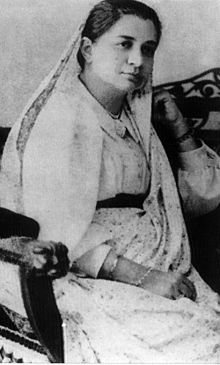Madam Bhikaji Rustom Cama
| Bhikhaji Cama | |
|---|---|
 |
|
| Born | 24 September 1861 Bombay, British India |
| Died | 13 August 1936 (aged 74) Bombay, British India |
| Organisation |
India House, Paris Indian Society, Indian National Congress |
| Movement | Indian independence movement |
Bhikaiji Rustom Cama (24 September 1861 – 13 August 1936) was one of the prominent figures in the Indian independence movement.
Bhikhaiji Rustom Cama was born to Bhikai Sorab Patel on 24 September 1861 in Bombay (now Mumbai) in a large, well-off Gujarati Parsi family. Her parents, Sorabji Framji Patel and Jaijibai Sorabji Patel, were well known in the city, where her father Sorabji—a lawyer by training and a merchant by profession—was an influential member of the Parsi community. She was invited to hoist the flag over the parliament in Germany.
Like many Parsi girls of the time, Bhikhaiji attended Alexandra Native Girl's English Institution. Bhikhaiji was by all accounts a diligent, disciplined child with a flair for languages.
On 3 August 1885, she married Rustom Cama, who was son of K. R. Cama. Her husband was a wealthy, pro-British lawyer who aspired to enter politics. It was not a happy marriage, and Bhikhaiji spent most of her time and energy in philanthropic activities and social work.
In October 1896, the Mumbai Presidency was hit first by famine, and shortly thereafter by bubonic plague. Bhikhaiji joined one of the many teams working out of Grant Medical College (which would subsequently become Haffkine's plague vaccine research centre), in an effort to provide care for the afflicted, and (later) to inoculate the healthy. Cama subsequently contracted the plague herself, but survived. Severely weakened, she was sent to Britain for medical care in .
She was preparing to return to India in 1908 when she came in contact with Shyamji Krishna Varma, who was well known in London's Indian community for fiery nationalist speeches he gave in Hyde Park. Through him, she met Dadabhai Naoroji, then president of the British Committee of the Indian National Congress, and for whom she came to work as private secretary. Together with Naoroji and Singh Rewabhai Rana, Cama supported the founding of Varma's Indian Home Rule Society in February 1905. In London, she was told that her return to India would be prevented unless she would sign a statement promising not to participate in nationalist activities. She refused. That same year Cama relocated to Paris, where—together with S. R. Rana and Munchershah Burjorji Godrej—she co-founded the Paris Indian Society. Together with other notable members of the movement for Indian sovereignty living in exile, Cama wrote, published (in the Netherlands and Switzerland) and distributed revolutionary literature for the movement, including Bande Mataram (founded in response to the Crown ban on the poem Vande Mataram) and later Madan's Talwar (in response to the execution of Madan Lal Dhingra). These weeklies were smuggled into India through the French colony of Pondichéry.
...
Wikipedia
